God used beautiful mathematics in creating the world. -Paul Dirac
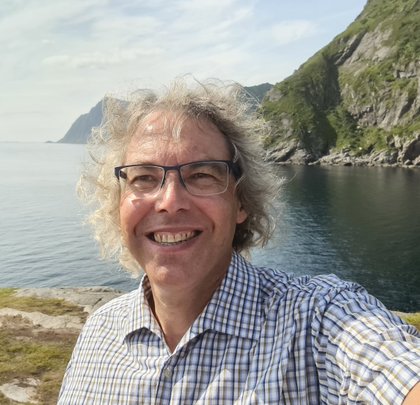
I am a professor of early childhood mathematics education at Queen Maud University College for Early Childhood Education in Trondheim, Norway. I am teaching early childhood mathematics and mathematics education in early childhood education teacher training. My research interests are in the field of teachers' beliefs about mathematics and mathematical knowledge.
Pre-service teacher training at the university level is first and foremost focused on the development of professional knowledge. In the mathematical field, this is mathematical content knowledge, mathematical content knowledge for teaching, and mathematics pedagogical content knowledge, which are not independent of each other but have to be learnt interlaced. Mathematical content knowledge alone is not enough to be a good teacher, but it is an indispensable prerequisite for understanding how to teach mathematics.
I aim to provide sound theoretical knowledge and opportunities for practical experience on working with mathematics in early childhood education. This includes students working independently with tasks, studying learning content, communicating and collaborating with each other, presenting their learning trails to others, and reflecting on practice and results.
I am teaching early childhood mathematics education at Queen Maud University College in Trondheim, Norway.
My recent research projects are
(1) student active teaching in early childhood teacher education and
(2) Stochastics in Children's Outdoor Play (SCOP).
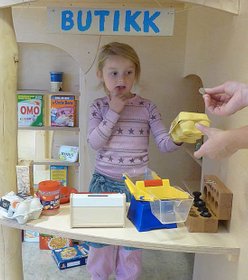
Measuring
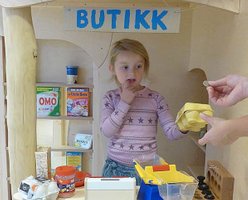
PLAY SHOP
Measuring
In the play shop, the children experience different types of measurment as well as money and numbers..
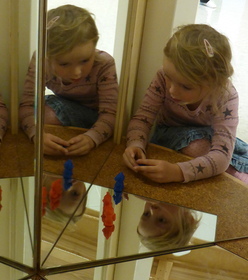
Symmetry
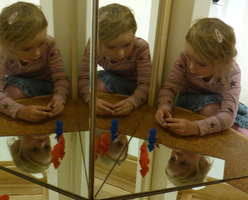
Symmetry
The mirrors can be rotated against each other. Thus, the children can explore different rotational symmetries.
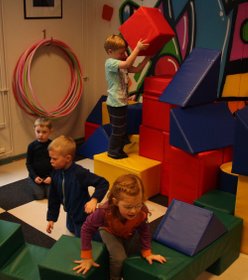
Designing
Designing
The children experience 2D and 3D shapes during construction play.
My colleagues and me developed a room where both young children can experience mathematics in a varied, creative and joyful way. It has been shown that ECEC institutions that provide a special room or place for mathematical experience have a significant impact on the development of children's mathematical competence (Thiel, 2010). The room offers possibilities for experiences in the six fundamental mathematical activities described by Bishop (1988). The conceptual framework is Dewey's (1934) theory about "having an experience" related to the ideas of "Room as a third pedagogue" (Ceppi & Zini, 1998) seen in a social constructivist perspective.
Children visit the room in groups and interact with the environment during free, guided and structured play. Even though, the children visit the room together with their teachers, joining the visit and participation in the activities is voluntary. The design of the room ensures that children cannot be harmed.
During the free play, the children are intrinsically interested in the materials in the room and start to experience their features. Scaffolding is needed to balance doing the activity and undergoing the mathematical ideas. In the guided and structured play the activities are focused around mathematical concepts, and the children's reflections are deeper.
Using the room helps ECEC professionals to work with mathematics in a more creative, varied, joyful and deeper way.
01.02.2024 until today
Professor at Queen Maud University College for Early Childhood Education in Trondheim, Norway
01.08.2011 until 31.01.2024
Associate Professor at Queen Maud University College for Early Childhood Education in Trondheim, Norway
01.04.2010 until 31.072011
Substitute professor for Mathematics and Mathematics Education at Pedagogical University College Schwäbisch Gmünd
26.11.2005 until 31.03.2010
Assistant Professor at Humboldt-University of Berlin, Philosophical Faculty IV, Institute for Educational Science, Department for Primary School Pedagogy
16.12.2005
Dissertation at Humboldt-University of Berlin, Philosophical Faculty IV.
Subject: "Modellierung der Bildungsgangempfehlung in Berlin" (Modelling the teachers' recommendation for higher education in Berlin)
Degree: Dr. phil. (PhD)
Mark: Summa cum Laude
26.11.2003 until 25.11.2005
Probationary teacher at Walter-Gropius-School in Berlin, Germany
01.06.1998 until 25.11.2003
Doctoral Fellowship at Humboldt-University of Berlin, Philosophical Faculty IV, Institut for Educational Science, Department for Primary School Pedagogy
26.11.2003 until 25.11.2005
Probationary teacher at
Walter-Gropius-School in Berlin, Germany,
Degree: 2nd State Examination as teacher
01.10.1995 until 05.12.1997
Teacher Training in Physics, Mathematics and German Language at
Humboldt-University of Berlin,
Degree: 1st State Examination as teacher
01.10.1987 until 14.03.1995
Studies in Physics at
Freien Universität Berlin, Germany,
Degree: Diplom Physiker
(advanced degree in physics)
01.09.1980 until 23.06.1987
Highschool and college:
Albrecht-Dürer-Oberschule (Gymnasium)
in Berlin, Germany,
Certificate of Maturity: Abitur
01.08.1974 until 31.07.1980
Primary school:
Schliemann-Grundschule
in Berlin, Germany
Copyright © All Rights Reserved
All information provided on these websites is provided for information purposes only and does not constitute a legal contract between me and any person or entity unless otherwise specified. Information on these websites is subject to change without prior notice. Although every reasonable effort is made to present current and accurate information, I make no guarantees of any kind. Any links to external websites are provided as a courtesy. They should not be construed as an endorsement by me of the content or views of the linked materials.